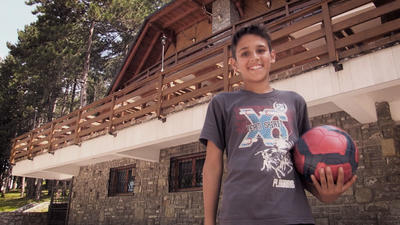As the ambulance screams across the Sahara, Taghry Walet Tokeye lies anxiously on the back seat with her husband by her side. Taghry has gone into labour. Before leaving Mbera refugee camp for Médecins Sans Frontières/Doctors Without Borders’ (MSF) operating theatre in Bassikounou, the MSF team tells Taghry that she is expecting not one, but possibly four children.
On arriving in Bassikounou, an ultrasound confirms that Taghry is pregnant with quadruplets and two of the babies are in the breech position.
Understandably, the news comes as a shock to both Taghry and her husband Masaya. While fearing for his wife and children’s health, Masaya has another cause for concern.
Stranded in the desert
“At the announcement of his four unborn children, the helpless husband did not know what to say or do,” says Karl Nawezi, MSF’s head of mission in Mauritania. “He did not see how he would ensure the survival of all these kids with the load he already supports.”
Taghry and Masaya, along with their six other children, were among the 15,000 people who fled the conflict in Mali in January 2013 to seek safety in neighbouring Mauritania.
Like the tens of thousands of others in the camp they arrived with nothing other than the clothes on their backs and are now completely dependent on humanitarian aid.
With the situation in Mali yet to return to normal, refugees like Taghry and Masaya face a future of isolation and uncertainty in the desert.
Emergency Caesarean
Back in the operating theatre, the MSF team makes the quick decision to perform a Caesarean section in order for Taghry to safely deliver.
“My family left our village of Shepherd Maoulague, near Léré, as we were afraid of the war,” explains Masaya.
“We came to Mbera to hide and be protected. But as they often lacked food in the camp, I decided to return from time to time in the bush to tend to my five cows, leaving my pregnant wife and my six other children in the camp.”
In order to receive supplies like tents, blankets and cooking equipment, people living in Mbera camp must be registered with the UN’s refugee agency, the UNHCR.
“During my absence from camp,” adds Masaya, “the UNHCR did not check me in again and my name was suddenly removed from the list of people to receive non-food and other humanitarian benefits to refugees."
Healthy quadruplets
News comes from the operating theatre that Taghry has given birth to three healthy boys and one healthy girl. They weigh between 1.8 kg and 2.45 kg. At the moment, the children are simply called Baby 1, 2, 3 and 4, as names are traditionally given when a child is baptised.
In the three weeks since they have been born, the four babies are doing well. They are being closely watched in the neo-natal room and the MSF team has provided Taghry and Masaya with all the supplies necessary – clothes, layette kits and milk – to keep their children healthy as they grow.
While the MSF team is overjoyed at the quadruplets’ progress since their dramatic entry into the world, one question remains: with 12 mouths to feed and little prospect of returning home, what does the future hold for this family in Mbera camp?
MSF in Mauritania
In Mauritania, MSF supports four primary healthcare centres in Mbera camp and at the Fassala border crossing post, and runs an operating theatre in the town of Bassikounou.
In 2012, MSF teams in Mauritania provided 91,860 consultations, assisted 836 deliveries and treated nearly 7,350 children suffering from severe malnutrition.





